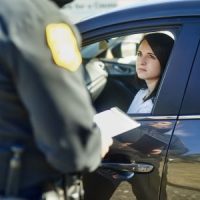Are DUI Roadblocks Legal in Florida?

Yes, DUI roadblocks are legal in Florida, as long as they adhere to all legal requirements. Some of these requirements are outlined below. For many years, the Supreme Court went back and forth on the question of whether DUI checkpoints violated the reasonable suspicion rule that limits police officer stops. The Supreme Court finally settled the matter in 1991.
Criminal cases often hinge on seemingly minor technicalities, mostly because the burden of proof is so high in criminal cases. So, to a Tampa criminal defense lawyer, a relatively minor violation of a DUI roadblock rule could mean the checkpoint is illegal and the DUI or other arrest violated the Constitution. That’s one reason why attention to detail matters so much in criminal cases.
Rights of Drivers at Checkpoints
We start this post not with what police officers must do, but what they must not do at a roadside checkpoint. Motorists don’t have the right to challenge a law enforcement contact at a valid checkpoint, but they do have the right to:
- Remain Silent: At DUI checkpoints, everyone must obey basic “license and proof of insurance please” commands. Otherwise, however, they have an absolute right to remain silent. Motorists need not answer questions or even roll down their windows.
- Refuse Field Sobriety Tests: The right to remain silent includes the right to physical silence. Suspects don’t have to perform field sobriety tests, like the walk-and-tun, unless they want to do so. They also don’t have to try on clothes, pose for pictures, or appear in lineups, once again unless the request involves a basic command, like posing for a mugshot.
- Refuse a Chemical Test: Tampa criminal defense lawyers disagree as to whether defendants should submit chemical samples. We usually recommend that suspects refuse them. The state doesn’t need your help collecting evidence to convict you.
DUI checkpoints also don’t affect the rights of criminal defendants at trial, such as the right to a Tampa criminal defense lawyer and the right to a fair and public trial.
Checkpoints Procedures
Supervisor authorization is one of the most important DUI roadblock requirements. Patrol officers cannot set up checkpoints on a whim. Additionally, the law enforcement office
must publicly announce the date, time, and location of the checkpoint. This public announcement must give motorists a chance to avoid the area if they so choose.
On a related note, attempting to evade a checkpoint by turning around or using side streets is technically legal. But they can be seen as suspicious behavior and may lead to a police stop.
Furthermore, all DUI checkpoints must be clearly designated and well lit. DUI checkpoints aren’t speed traps. Additionally, police officers at checkpoints must use a predetermined formula to stop vehicles, such as stopping every third car, to avoid arbitrary stops. They must stick to this formula, unless traffic backs up. Then, they may change the formula to allow traffic to move more freely.
Under the law, most stops must be limited to three minutes to prevent impeding traffic. In this context, a “stop” usually begins when a driver reaches the edge of a checkpoint and ends when the driver passes the inspecting officer.
Count on a Diligent Hillsborough County Attorney
A criminal charge is not the same thing as a criminal conviction. For a confidential consultation with an experienced criminal defense lawyer in Tampa, contact the OA Law Firm. Our main office is conveniently located near the Tampa International Airport.




